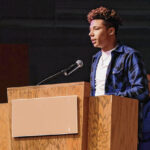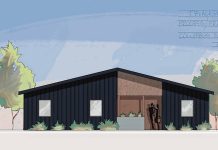
Mike Wolanin | The Republic Dr. Woody Myers delivers the keynote speech during the annual NAACP, African American Fund and IUPUC Martin Luther King Jr. Day program at The Commons in Columbus, Ind., Monday, Feb. 28, 2022. The program was delayed to the end of February due to the ongoing COVID-19 pandemic.
The day the Rev. Martin Luther King Jr. was killed on April 4, 1968, a passionate dream of making a difference was born within a young Woody Myers.
He was 14 when he came in from backyard hoops that evening into his family’s home at 29th and Arsenal in Indianapolis.
And then he saw the news, and also a live local news feed from elsewhere in the city, where a visiting Robert F. Kennedy was announcing King’s death to a stunned crowd.
“I sat there and watched television virtually uninterrupted for hours, wondering to myself, ‘What am I supposed to do now?’ Dr. King had been such an inspiration to me.”
Myers, now 65, became a physician, pushing even years ago for equal access for all to quality medical care, a platform that was part of his unsuccessful run for Indiana governor in 2020. The former state health commissioner was the keynote speaker Monday evening at the rescheduled King Day program coordinated by the Columbus/Bartholomew County Area Chapter of the NAACP, IUPUC, and the African American Fund of Bartholomew County.
The program was moved to the end of Black History Month after organizers deemed that a rise in the COVID-19 omicron variant made the original Jan. 17 public program unsafe.
About 110 people attended at The Commons in downtown Columbus, including leaders in government, law enforcement, education, the nonprofit sector, and faith communities.
Myers’ remarks focused in part on his range of emotions over King’s death.
“It was devastating to me,” Myers said, adding that part of him wanted to somehow make King’s horrible demise eventually count for something redeeming. “And half of me wanted to destroy something and let people know that this just wasn’t right.”
He opted for the higher road, and a few years later, found himself working an emergency room stint at Massachusetts General Hospital in Boston while a medical student at Harvard University in Cambridge. He was stitching a groggy and drunken 13-year-old’s head laceration one night when the youngster finally perked up and suddenly grew angry amid his surroundings.
The patient noted Myers standing over him and loudly yelled a racial slur, following with “What are you doing?”
It marked one of the first times Myers had been the subject of such public racial ridicule. Myers told the patient that he didn’t want to discharge him until he had a chance to speak with his parents.
Amid his lengthy presentation, the doctor highlighted a seldom-heard King quote delivered in a speech at a convention of the Medical Committee for Human Rights in Chicago in March 1966: ”Of all the forms of inequality, injustice in health care is the most shocking and inhumane.”
Others at the gathering acknowledged the work of King and others who worked for years on behalf of civil and human rights. Pastor Felipe Martinez at Columbus’ First Presbyterian Church, among the local leaders in social justice awareness, thanked God in an opening prayer that “we stand on the shoulders of giants.”
Bishop Johnnie Edwards, president of the Columbus/Bartholomew County Area Chapter of the NAACP, has been more than open about some of his ongoing frustrations with cases of racism locally. But he sounded an optimistic note Monday.
“I’m excited about what’s taking place in our community,” he said, adding that there is an emphasis on positive change.
Mike Wolanin | The Republic Columbus/Bartholomew County Area NAACP Chapter Vice President Alyse Tucker-Bounds accepts an IUPUC Excellence in Diversity Award during the NAACP, African American Fund and IUPUC Martin Luther King Jr. Day program at The Commons in Columbus, Ind., Monday, Feb. 28, 2022. The program was delayed to the end of February due to the ongoing COVID-19 pandemic.
Mike Wolanin | The Republic Columbus/Bartholomew County Area NAACP Chapter President Johnnie Edwards accepts an IUPUC Excellence in Diversity Award during the NAACP, African American Fund and IUPUC Martin Luther King Jr. Day program at The Commons in Columbus, Ind., Monday, Feb. 28, 2022. The program was delayed to the end of February due to the ongoing COVID-19 pandemic.
Mike Wolanin | The Republic IUPUC assistant psychology professor Mark Jaime accepts an IUPUC Excellence in Diversity Award for his research on autism treatment during the NAACP, African American Fund and IUPUC Martin Luther King Jr. Day program at The Commons in Columbus, Ind., Monday, Feb. 28, 2022. The program was delayed to the end of February due to the ongoing COVID-19 pandemic.
Mike Wolanin | The Republic Dr. Woody Myers delivers the keynote speech during the annual NAACP, African American Fund and IUPUC Martin Luther King Jr. Day program at The Commons in Columbus, Ind., Monday, Feb. 28, 2022. The program was delayed to the end of February due to the ongoing COVID-19 pandemic.
Mike Wolanin | The Republic Dr. Woody Myers delivers the keynote speech during the annual NAACP, African American Fund and IUPUC Martin Luther King Jr. Day program at The Commons in Columbus, Ind., Monday, Feb. 28, 2022. The program was delayed to the end of February due to the ongoing COVID-19 pandemic.
Mike Wolanin | The Republic Columbus Police Chief Mike Richardson, left, and Columbus Mayor Jim Lienhoop listen to the keynote speech by Dr. Woody Myers during the annual NAACP, African American Fund and IUPUC Martin Luther King Jr. Day program at The Commons in Columbus, Ind., Monday, Feb. 28, 2022. The program was delayed to the end of February due to the ongoing COVID-19 pandemic.
Mike Wolanin | The Republic Guests listen to Dr. Woody Myers keynote speech during the annual NAACP, African American Fund and IUPUC Martin Luther King Jr. Day program at The Commons in Columbus, Ind., Monday, Feb. 28, 2022. The program was delayed to the end of February due to the ongoing COVID-19 pandemic.
Mike Wolanin | The Republic Dr. Woody Myers delivers the keynote speech during the annual NAACP, African American Fund and IUPUC Martin Luther King Jr. Day program at The Commons in Columbus, Ind., Monday, Feb. 28, 2022. The program was delayed to the end of February due to the ongoing COVID-19 pandemic.
Pictured: Dr. Woody Myers delivers the keynote speech during the annual NAACP, African American Fund and IUPUC Martin Luther King Jr. Day program Monday at The Commons in downtown Columbus. The program was delayed to the end of February due to the ongoing COVID-19 pandemic. Mike Wolanin | The Republic
Mike Wolanin | The Republic Dr. Woody Myers delivers the keynote speech during the annual NAACP, African American Fund and IUPUC Martin Luther King Jr. Day program at The Commons in Columbus, Ind., Monday, Feb. 28, 2022. The program was delayed to the end of February due to the ongoing COVID-19 pandemic.
Mike Wolanin | The Republic Columbus/Bartholomew County Area NAACP Chapter President Johnnie Edwards addresses guests to the annual NAACP, African American Fund and IUPUC Martin Luther King Jr. Day program at The Commons in Columbus, Ind., Monday, Feb. 28, 2022. The program was delayed to the end of February due to the ongoing COVID-19 pandemic.
Mike Wolanin | The Republic Bartholomew County Sheriff’s Major John Martoccia, left, and Chief Deputy Chris Lane attend the annual NAACP, African American Fund and IUPUC Martin Luther King Jr. Day program at The Commons in Columbus, Ind., Monday, Feb. 28, 2022. The program was delayed to the end of February due to the ongoing COVID-19 pandemic.
Mike Wolanin | The Republic Columbus/Bartholomew County Area NAACP Chapter Vice President Alyse Tucker-Bounds welcomes guests to the annual NAACP, African American Fund and IUPUC Martin Luther King Jr. Day program at The Commons in Columbus, Ind., Monday, Feb. 28, 2022. The program was delayed to the end of February due to the ongoing COVID-19 pandemic.
Mike Wolanin | The Republic Pastor Felipe Martinez delivers the invocation at the start of the annual NAACP, African American Fund and IUPUC Martin Luther King Jr. Day program at The Commons in Columbus, Ind., Monday, Feb. 28, 2022. The program was delayed to the end of February due to the ongoing COVID-19 pandemic.
Mike Wolanin | The Republic Pastor Felipe Martinez delivers the invocation at the start of the annual NAACP, African American Fund and IUPUC Martin Luther King Jr. Day program at The Commons in Columbus, Ind., Monday, Feb. 28, 2022. The program was delayed to the end of February due to the ongoing COVID-19 pandemic.
Mike Wolanin | The Republic The Rev. Oscar Tipton addresses guests at the start of the annual NAACP, African American Fund and IUPUC Martin Luther King Jr. Day program at The Commons in Columbus, Ind., Monday, Feb. 28, 2022. The program was delayed to the end of February due to the ongoing COVID-19 pandemic.
Mike Wolanin | The Republic Pictures are set up on a table to remember NAACP members Dennis Roberts, John Richey and Kimberly Easton at the annual NAACP, African American Fund and IUPUC Martin Luther King Jr. Day program at The Commons in Columbus, Ind., Monday, Feb. 28, 2022. The program was delayed to the end of February due to the ongoing COVID-19 pandemic.
Mike Wolanin | The Republic Columbus/Bartholomew County Area NAACP Chapter President Johnnie Edwards thanks guests for attending the NAACP, African American Fund and IUPUC Martin Luther King Jr. Day program at The Commons in Columbus, Ind., Monday, Feb. 28, 2022. The program was delayed to the end of February due to the ongoing COVID-19 pandemic.
Mike Wolanin | The Republic Heritage Fund President and CEO Tracy Souza accepts the NAACP Outstanding Distinguished Service Award on behalf of the Heritage Fund during the NAACP, African American Fund and IUPUC Martin Luther King Jr. Day program at The Commons in Columbus, Ind., Monday, Feb. 28, 2022. The program was delayed to the end of February due to the ongoing COVID-19 pandemic.
Mike Wolanin | The Republic Jaxson Scruggs accepts the NAACP Outstanding Athlete Award during the NAACP, African American Fund and IUPUC Martin Luther King Jr. Day program at The Commons in Columbus, Ind., Monday, Feb. 28, 2022. The program was delayed to the end of February due to the ongoing COVID-19 pandemic.
Mike Wolanin | The Republic Zacaria Scruggs accepts the NAACP Outstanding Student Award during the NAACP, African American Fund and IUPUC Martin Luther King Jr. Day program at The Commons in Columbus, Ind., Monday, Feb. 28, 2022. The program was delayed to the end of February due to the ongoing COVID-19 pandemic.
Mike Wolanin | The Republic Cabrina Jackson accepts the NAACP Outstanding Business Award for her business Cabrina’s Safe Haven for Kids during the NAACP, African American Fund and IUPUC Martin Luther King Jr. Day program at The Commons in Columbus, Ind., Monday, Feb. 28, 2022. The program was delayed to the end of February due to the ongoing COVID-19 pandemic.
Mike Wolanin | The Republic Paulette Roberts accepts an NAACP Outstanding Citizen Award during the NAACP, African American Fund and IUPUC Martin Luther King Jr. Day program at The Commons in Columbus, Ind., Monday, Feb. 28, 2022. The program was delayed to the end of February due to the ongoing COVID-19 pandemic.
Mike Wolanin | The Republic Columbus/Bartholomew County Area NAACP Chapter President Johnnie Edwards presents Paulette Roberts with an NAACP Outstanding Citizen Award during the NAACP, African American Fund and IUPUC Martin Luther King Jr. Day program at The Commons in Columbus, Ind., Monday, Feb. 28, 2022. The program was delayed to the end of February due to the ongoing COVID-19 pandemic.




























